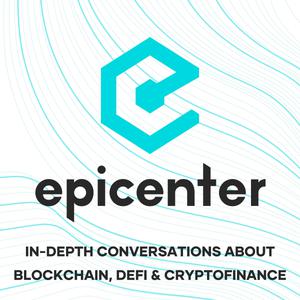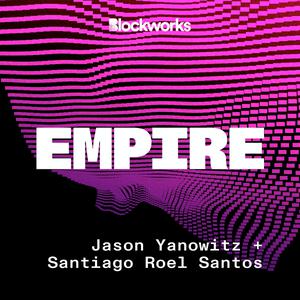
Epicenter - Learn about Crypto, Blockchain, Ethereum, Bitcoin and Distributed Technologies
Epicenter Media
Epicenter is a podcast about the technologies, projects & people driving decentralization and the global blockchain revolution.
- 1 hour 4 minutesBalancer: Custom AMMs and Liquidity Solutions - Fernando Martinelli
While AMMs (automated market makers) represent a DeFi innovation in themselves, research and experimentation have pushed the possibilities well beyond the limitations of the classic x*y=k constant product formula originally used by LPs. One of the main innovators in this field remains Balancer - from multi-token pools with different weights replicating TradFi indices, to dynamic ratios that can be changed under certain conditions preventing further imbalances, Balancer set in place user protection measures. With the recent release of Balancer V3, developers get more freedom to experiment with AMMs, introducing features such as hooks that enable limitless pool customisation, boosted pools that combine LP fees with yield farming from money markets, and many more.
Topics covered in this episode:
- Balancer’s inception
- The evolution of AMMs
- Balancer vs. other AMM competitors
- Fungible vs. non-fungible liquidity
- Balancer v3
- Boosted liquidity pools
- DevEx and hooks in Balancer v3
- Preventing stablecoin depegs
- MEV mitigation & CoW AMM
- Scaling to L2s
- Gyroscope & QuantAMM
- Balancer’s B2C & B2B solutions
Episode links:
Sponsors:
- Gnosis: Gnosis builds decentralized infrastructure for the Ethereum ecosystem, since 2015. This year marks the launch of Gnosis Pay— the world's first Decentralized Payment Network. Get started today at - gnosis.io
- Chorus1: Chorus1 is one of the largest node operators worldwide, supporting more than 100,000 delegators, across 45 networks. The recently launched OPUS allows staking up to 8,000 ETH in a single transaction. Enjoy the highest yields and institutional grade security at - chorus.one
This episode is hosted by Friederike Ernst.
31 January 2025, 2:16 pm - 59 minutes 58 secondsKiln: Democratising Value Creation in Digital Assets - Laszlo Szabo
Kiln operates as a staking-as-a-service platform, primarily focused on Ethereum, enabling users to stake assets programmatically, managing validators, rewards, and commissions through an API-first approach. In addition, it offers white-label solutions that allow institutional clients to integrate staking functionalities into their own offerings, with unified API for all assets and rewards, making it easier for businesses to provide staking services without developing the infrastructure themselves. With more than $13bn worth of assets secured, Kiln has proven its reliability, having no slashing events thus far. Moreover, Kiln widget offers a no-code experience for launching custom earn options, integrated with every major wallet and custodian.
Topics covered in this episode:
- Laszlo’s background
- Founding Kiln
- Enterprise-grade validators and slashing
- DevOps & infrastructure maintenance
- ETH staking and custody
- Liquid staking and restaking
- The evolution of staking providers and requirements
- DeFi yield
- Institutional investors
- Kiln roadmap
Episode links:
Sponsors:
- Gnosis: Gnosis builds decentralized infrastructure for the Ethereum ecosystem, since 2015. This year marks the launch of Gnosis Pay— the world's first Decentralized Payment Network. Get started today at - gnosis.io
- Chorus1: Chorus1 is one of the largest node operators worldwide, supporting more than 100,000 delegators, across 45 networks. The recently launched OPUS allows staking up to 8,000 ETH in a single transaction. Enjoy the highest yields and institutional grade security at - chorus.one
This episode is hosted by Friederike Ernst.
23 January 2025, 1:04 pm - 49 minutes 43 secondsBabylon: Self-Custodial Bitcoin Native Staking & Bitcoin-Secured Networks - David Tse
Throughout the years, there were many attempts of tapping into Bitcoin’s liquidity and security, but almost all of them came with different caveats. Most notably, wrapped BTC (wBTC) depended on the wrapper contract security. However, the recent surge in research and development for native solutions has led to breakthroughs previously thought impossible. Babylon launched native BTC staking and plans to further expand this to secure other blockchains, in a model similar to that of mesh security. This would not only help secure other networks, but it would also unlock liquidity from the mother chain through liquid staking derivatives.
Topics covered in this episode:
- David’s background
- The evolution of Babylon
- The Bitcoin Renaissance
- Technical challenges of implementing Bitcoin staking
- The OP_CAT upgrade
- Babylon’s Bitcoin staking & Bitcoin-secured networks
- Bridging liquidity & LSTs
- Securing multiple chains and slashing
- Babylon chain - aggregating Bitcoin-secured networks
- Could Bitcoin become a POS chain?
- Babylon upgradeability
Episode links:
Sponsors:
- Gnosis: Gnosis builds decentralized infrastructure for the Ethereum ecosystem, since 2015. This year marks the launch of Gnosis Pay— the world's first Decentralized Payment Network. Get started today at - gnosis.io
- Chorus1: Chorus1 is one of the largest node operators worldwide, supporting more than 100,000 delegators, across 45 networks. The recently launched OPUS allows staking up to 8,000 ETH in a single transaction. Enjoy the highest yields and institutional grade security at - chorus.one
This episode is hosted by Brian Fabian Crain & Sebastien Couture.
14 January 2025, 8:05 pm - 1 hour 4 minutesRedStone: The Oracle Pioneering the Future of DeFi - Marcin Kaźmierczak
The DeFi landscape has significantly evolved since 2018 when Chainlink was launched. Recent developments such as L2 rollups, liquid staking, restaking and the rise of BTC DeFi have created huge demand for more customizable, modular oracles that would be able to provide accurate data for countless use cases, crosschain. RedStone set out to do exactly that and are now securing over $6.6 bn worth of assets (1000+ assets), across more than 60 chains, without a single mispricing event.
Topics covered in this episode:
- Marcin’s background
- Early oracle landscape
- RedStone’s technical architecture
- Network incentives
- Data aggregation module
- Node operator module
- Push vs. Pull oracles
- RedStone’s business model
- The role of RedStone token
- Pyth vs. RedStone
- Restaking
- Oracle extractable value
- Synergies between oracles and institutional investors
Episode links:
Sponsors:
- Gnosis: Gnosis builds decentralized infrastructure for the Ethereum ecosystem, since 2015. This year marks the launch of Gnosis Pay— the world's first Decentralized Payment Network. Get started today at - gnosis.io
- Chorus1: Chorus1 is one of the largest node operators worldwide, supporting more than 100,000 delegators, across 45 networks. The recently launched OPUS allows staking up to 8,000 ETH in a single transaction. Enjoy the highest yields and institutional grade security at - chorus.one
This episode is hosted by Brian Fabian Crain.
8 January 2025, 7:53 pm - 1 hour 6 minutesPrivado ID & Quark ID: On-Chain ZK-Powered Unified ID - Diego Fernandez & Evin McMullen
Traditional KYC and AML regulations have often forced companies to comply, without having the right tools to do so. Simply storing users’ personal information led to the creation of security honeypots which haven’t gone unnoticed by hackers. Web3 solutions like Privado ID aim to cryptographically prove certain traits from a user’s personal data, without disclosing it to the enquirer. This is usually made possible through zero knowledge proofs which allow users to store their personal data on their own device and only exchange verifiable credentials with trusted issuers. City of Buenos Aires has adopted a similar implementation through their Quark ID system, a digital trust framework that creates a new digital identity system, giving people control over their information.
Topics covered in this episode:
- Evin’s background and founding Disco
- Polygon ID acquisition and blockchain agnostic decentralized IDs
- Diego’s background, from private to public practice
- Privado ID and its registry of reputation issuers
- Use cases, DevEx and UX
- KYC and regulations
- Buenos Aires digital ID system
- Real world applications of Quark ID
- UX frictions and solutions
- ZK verification
- Societal impact and adoption
- Ethical considerations around DIDs
- The role of blockchains in other real world applications
Episode links:
Sponsors:
- Gnosis: Gnosis builds decentralized infrastructure for the Ethereum ecosystem, since 2015. This year marks the launch of Gnosis Pay— the world's first Decentralized Payment Network. Get started today at - gnosis.io
- Chorus1: Chorus1 is one of the largest node operators worldwide, supporting more than 100,000 delegators, across 45 networks. The recently launched OPUS allows staking up to 8,000 ETH in a single transaction. Enjoy the highest yields and institutional grade security at - chorus.one
This episode is hosted by Friederike Ernst.
1 January 2025, 12:25 pm - 1 hour 9 minutesAbundance: The First 1 Gigagas/second Stack for Sovereign Rollups - Hilmar Orth
One of the most limited blockchain resources is blockspace. From Bitcoin’s Blocksize Wars to Ethereum’s scaling roadmap, a common denominator seems to have emerged in the form of rollups. Advancements in zero knowledge proofs have enabled trustless bridges, which are a cornerstone to onboarding liquidity to any blockchain. Furthermore, Celestia’s modular approach to blockchain architecture and their recent commitment to gigabyte blocks of data availability marked the beginning of commoditization for rollups. Abundance is the first rollup-as-a-service platform that is able to scale to 1 gigagas/second throughput, finally bringing off-chain applications, on-chain.
Topics covered in this episode:
- Gelato’s pivot to rollup-as-a-service platform
- Sovereign rollups
- Enshrined bridges and settlement proofs
- Abundance and 1 Gigagas/second rollups
- Modularity
- Security assumptions
- Sequencer (de)centralisation
- Social consensus
- Celestia’s DA layer bandwidth
- Ethereum native rollups
- Decentralisation and censorship-resistance
Episode links:
Sponsors:
- Gnosis: Gnosis builds decentralized infrastructure for the Ethereum ecosystem, since 2015. This year marks the launch of Gnosis Pay— the world's first Decentralized Payment Network. Get started today at - gnosis.io
- Chorus1: Chorus1 is one of the largest node operators worldwide, supporting more than 100,000 delegators, across 45 networks. The recently launched OPUS allows staking up to 8,000 ETH in a single transaction. Enjoy the highest yields and institutional grade security at - chorus.one
This episode is hosted by Friederike Ernst.
24 December 2024, 10:16 pm - 1 hour 10 minutesMonad: The EVM-Compatible 10,000 TPS L1 Blockchain - Keone Hon
The status quo for developers choosing an ecosystem for their blockchain usually revolves around trade-offs: do they go for Ethereum’s network effect, liquidity and decentralisation, or sacrifice some features in favour of a higher throughput. Monad aims to combine the best of both worlds, while not being limited by excessive hardware requirements. Monad built an EVM-compatible L1 from the ground up, completely rethinking execution and consensus, in order to achieve the infamous 10,000 TPS. This extreme scalability is made possible through Monad’s optimistic parallel execution which is asynchronous from consensus. The latter has also been optimized in order to achieve single-slot finality. Monad’s proprietary database architecture allows for states to be stored on SSDs instead of RAM, which ensures that consumer-grade hardware can run a Monad node, further increasing decentralisation.
Topics covered in this episode:
- Keone’s background
- TradFi vs. DeFi and how Monad was founded
- EVM’s network effect vs. other VMs
- How Monad aims to improve EVM’s performance
- MonadDB
- MonadBFT - New consensus mechanism
- Asynchronous execution
- MEV and proposer-builder separation (PBS)
- Monad’s throughput
- Further scaling and limitations
- Alternatives & trade-offs
- DevEx
- Community & ecosystem development
Episode links:
Sponsors:
- Gnosis: Gnosis builds decentralized infrastructure for the Ethereum ecosystem, since 2015. This year marks the launch of Gnosis Pay— the world's first Decentralized Payment Network. Get started today at - gnosis.io
- Chorus1: Chorus1 is one of the largest node operators worldwide, supporting more than 100,000 delegators, across 45 networks. The recently launched OPUS allows staking up to 8,000 ETH in a single transaction. Enjoy the highest yields and institutional grade security at - chorus.one
This episode is hosted by Brian Fabian Crain.
18 December 2024, 7:10 pm - 49 minutes 28 secondsSuccinct: Every Rollup Will Be a ZK Rollup! - Uma Roy
Polynomials are quintessential in machine learning for establishing relationships between outputs and inputs. However, there is also a field in cryptography which could not be made possible without polynomials - zero-knowledge technology. In zero-knowledge proof systems, computations are often represented as arithmetic circuits, and these circuits are translated into polynomials. This process is crucial for generating proofs that can demonstrate the correctness of computations without revealing the underlying data. The involved complexity explains the massive adoption hurdle for zk rollups compared to optimistic ones. Succinct aims to simplify the use of zero-knowledge proofs by providing a zkVM (SP1) that allows code written in languages like Rust to be proven in a privacy-preserving way. By doing so, it aims to lower the barrier to implementing zk-rollups and increase their adoption.
Topics covered in this episode:
- Uma’s background and her interest in zero knowledge tech
- How Succinct’s story began
- ZK light clients
- ZK circuits
- SP1 and the RISC-V instruction set
- The prover network
- Use cases
- ZK rollups and commoditizing ZKPs
- Incentivizing provers
- Succinct’s business model
- Supported blockchain applications
- Bottlenecks in ZK adoption
- Succinct metrics
- SP1’s competitive advantage and future roadmap
- The real world impact of verifiability
Episode links:
Sponsors:
- Gnosis: Gnosis builds decentralized infrastructure for the Ethereum ecosystem, since 2015. This year marks the launch of Gnosis Pay— the world's first Decentralized Payment Network. Get started today at - gnosis.io
- Chorus1: Chorus1 is one of the largest node operators worldwide, supporting more than 100,000 delegators, across 45 networks. The recently launched OPUS allows staking up to 8,000 ETH in a single transaction. Enjoy the highest yields and institutional grade security at - chorus.one
This episode is hosted by Friederike Ernst.
11 December 2024, 12:45 am - 1 hour 10 minutesBitcoin OS: Bitcoin Block 853626 Changed Everything For BTC Smart Contracts - Edan Yago
Bitcoin’s Taproot update paved the way for a new & exciting era for Bitcoin, as it expanded its use case far beyond that of an immutable ledger. However, Ordinals, BRC-20 tokens and, more recently, Runes, have limited functionality compared to what DeFi is capable of, on other smart contract blockchains. BitcoinOS envisions a revolutionary Bitcoin economy that stems from truly programmable tokens, unlocking staking, governance and many other use cases. Using BitSNARK and Grail, BitcoinOS enables Bitcoin “rollups”, which act as execution environments that use BTC as gas fee and inherit security from the L1. The missing link was always a trustless bridge between Bitcoin L1 and any potential L2. And Grail Bridge achieved just that - using zero knowledge cryptography, BTC could be transferred to other chains without relying on other custodians’ trust assumptions. In that sense, Bitcoin block #853626 is historically meaningful as it contains the first-ever onchain verification of a zero knowledge proof, on Bitcoin. A truly programmable smart contract operating system on Bitcoin was no longer a mere concept…it became a reality through BitcoinOS.
Topics covered in this episode:
- Yago's background
- The effect of Trump’s election on the crypto industry
- The goal behind BitcoinOS
- The history of Bitcoin’s programmability
- Verifying ZK proofs on Bitcoin
- Taproot
- Ordinals
- BitSNARK, Grail bridge and Merkle Mesh
- BitcoinOS modularity and sequencing
- An impending (r)evolution of the industry
- Bitcoin vs. Ethereum L2 landscape
- Bringing Bitcoin liquidity to Cardano
- BitcoinOS roadmap
Episode links:
Sponsors:
- Gnosis: Gnosis builds decentralized infrastructure for the Ethereum ecosystem, since 2015. This year marks the launch of Gnosis Pay— the world's first Decentralized Payment Network. Get started today at - gnosis.io
- Chorus1: Chorus1 is one of the largest node operators worldwide, supporting more than 100,000 delegators, across 45 networks. The recently launched OPUS allows staking up to 8,000 ETH in a single transaction. Enjoy the highest yields and institutional grade security at - chorus.one
This episode is hosted by Sebastien Couture.
3 December 2024, 5:20 pm - 1 hour 5 minutesSymbiotic: Scaling Shared Security Through Restaking - Misha Putiatin
Bootstrapping and maintaining a validator set can be a challenging endeavour, especially for projects that are in search of a product market fit. However, this does not mean one should abandon the ethos of decentralisation in favour of a more streamlined centralised approach. The notion of shared security had been previously explored in the Cosmos ecosystem, but Symbiotic takes it a step further, making it readily available for any project, regardless of its native blockchain, through restaking. Symbiotic is a modular coordination layer that sources node operators and economic security in a maximally capital-efficient manner.
Topics covered in this episode:
- Misha’s background
- Symbiotic’s origin story
- How Symbiotic tackles decentralisation
- The role of restaking in proof-of-stake models
- The economics of restaking
- The architecture of Symbiotic
- Liquid restaking tokens (LRT)
- Expanding restaking beyond Ethereum
- Slashing
- Symbiotic smart contract immutability and future updates
- Ecosystem development
Episode links:
Sponsors:
- Gnosis: Gnosis builds decentralized infrastructure for the Ethereum ecosystem, since 2015. This year marks the launch of Gnosis Pay— the world's first Decentralized Payment Network. Get started today at - gnosis.io
- Chorus1: Chorus1 is one of the largest node operators worldwide, supporting more than 100,000 delegators, across 45 networks. The recently launched OPUS allows staking up to 8,000 ETH in a single transaction. Enjoy the highest yields and institutional grade security at - chorus.one
This episode is hosted by Brian Fabian Crain.
26 November 2024, 10:06 pm - 1 hour 4 minutesAri Juels: Can AI Weaponize Blockchain Smart Contracts? - Chainlink
A smart contract’s rigid rule system represents a double-edged sword. ‘The Code is Law’, but what happens when rogue large language models or AI agents bend the Law? Can smart contracts be weaponised to serve a criminal agenda? In his ‘Oracle’ novel, Ari Juels explores this thesis and issues an eery warning regarding the blockchain x AI intersection. In this imminent future, oracles play a crucial role, allowing LLMs to push data on-chain or smart contracts to pull off-chain data.
Topics covered in this episode:
- Criminal Smart Contracts
- Oracle x LLM convergence
- Preventing malicious intents through oracle systems
- AI x crypto use cases
- DAOs
- Entropy in voting behaviours
- Dark DAOs
- TEEs & private smart contracts
- MEV & proofs of transaction ordering
- Future blockchain research
Episode links:
Sponsors:
- Gnosis: Gnosis builds decentralized infrastructure for the Ethereum ecosystem, since 2015. This year marks the launch of Gnosis Pay— the world's first Decentralized Payment Network. Get started today at - gnosis.io
- Chorus1: Chorus1 is one of the largest node operators worldwide, supporting more than 100,000 delegators, across 45 networks. The recently launched OPUS allows staking up to 8,000 ETH in a single transaction. Enjoy the highest yields and institutional grade security at - chorus.one
This episode is hosted by Brian Fabian Crain.
19 November 2024, 8:35 pm - More Episodes? Get the App
Your feedback is valuable to us. Should you encounter any bugs, glitches, lack of functionality or other problems, please email us on [email protected] or join Moon.FM Telegram Group where you can talk directly to the dev team who are happy to answer any queries.
 Unchained
Unchained
 The Scoop
The Scoop
 On The Brink with Castle Island
On The Brink with Castle Island
 Bankless
Bankless
 Empire
Empire
 web3 with a16z crypto
web3 with a16z crypto